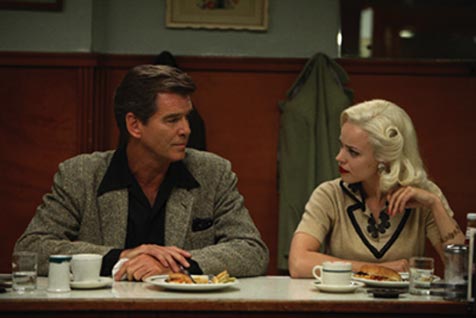Married Life
Chris Cooper, Pierce Brosnan, Rachel McAdams, and Patricia Clarkson star in a film written by Ira Sachs and Owen Moverman and directed by Sachs.

If the story is set in 1949 and it stirs in liberal doses of infidelities, double crosses, and intimations of murder, the film noir sauce can’t be far away. Sure enough, the elegantly visualized and soothingly slow-paced Married Life takes a sinister turn or two along its leisurely path, particularly when our protagonist entertains fast-acting poison as a solution to his midlife romantic woes.
Even so, director and cowriter Ira Sachs’s film doesn’t lean heavily on the neo-noir card. Instead, he invokes the particular kind of wrenching emotional and moral tension of Woody Allen’s murder pictures. Like Allen’s darker films, Married Life plays out with a fable-like glow rather than the snarly existential grit of noir, and therein lies much of its charm. Period-piece cred is kept intact (apart from the drably generic musical score), and a clean, slow, and intimate quality of storytelling gives the movie a burnished atmosphere, like something experienced in front of a fireplace.
Pierce Brosnan, still rehabilitating from Bond typecasting, is surprisingly good here. Or at least he suits the role as a handsome, womanizing cad, who admits early on in his running voice-over monologue, “I always thought marriage was a mild kind of illness : to which I was immune.” But he is not immune to the wiles of a pretty platinum blonde with ruby lips (Rachel McAdams, a lovely but weak link in the cast), even if she is attached-albeit illicitly-to his buttoned-down married friend (Chris Cooper, perfectly cast and perfectly uptight). Cooper’s troubled character fears that divorcing his wife (Patricia Clarkson, radiant in her own way) will crush her spirit, but the plot begins to thicken from this and other faulty assumptions.
It’s one of those films in which we know more than the characters do, where dry comedy sneaks into the nearly nasty proceedings almost without our realizing it. Characters repeat lines, like fortune cookie wisdoms, such as, “It will be hard for you to build your happiness upon the unhappiness of others.” And when a lover kisses off her mate with the line, “Let’s see if we can get to the end of our lives without further damage,” we don’t so much shed a tear as nod at the campy Chandler-esquerie of the moment. Maybe there’s a higher noir blood count in the veins than we imagined. Whatever the case, Married Life is a stylish little joyride of a film.



